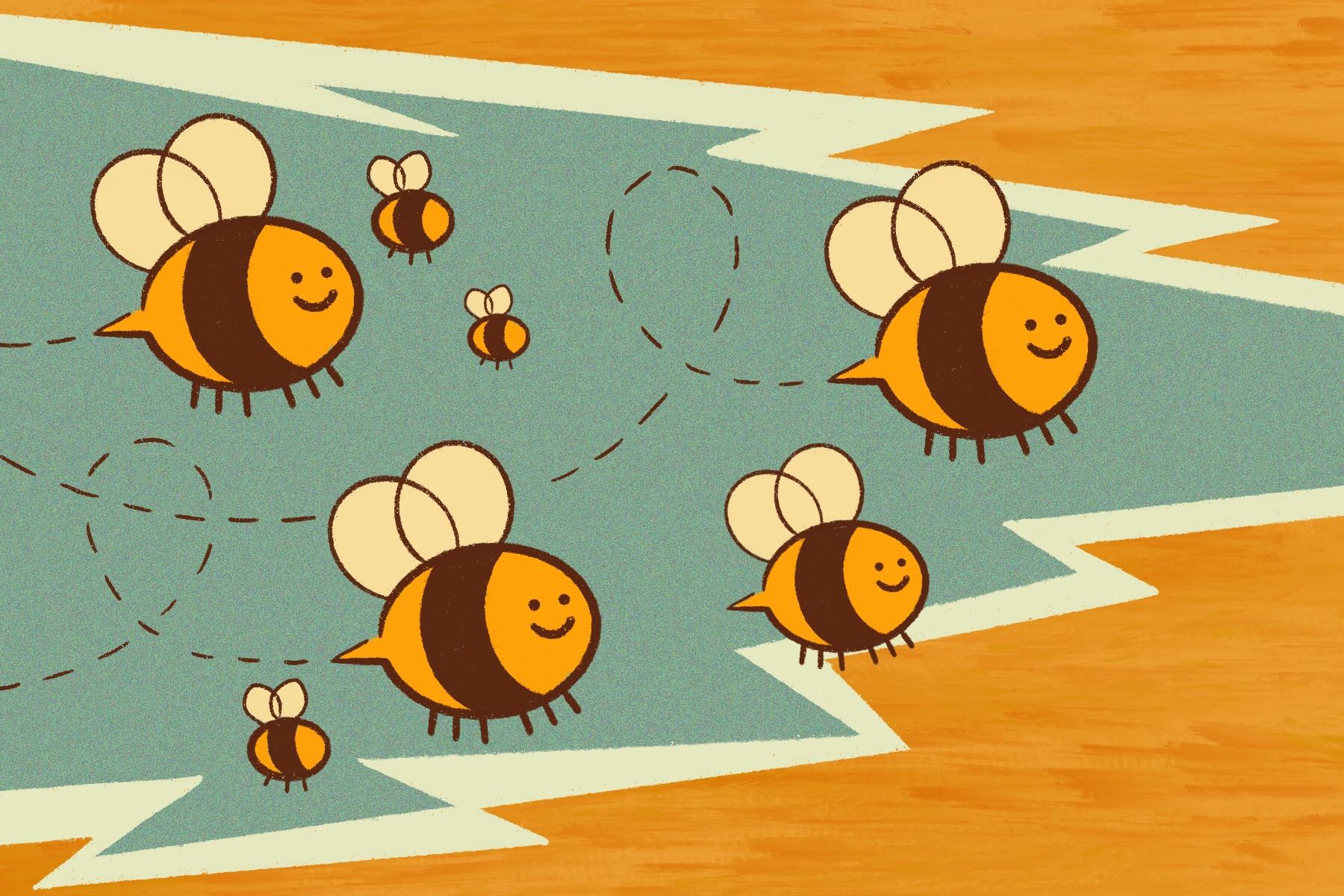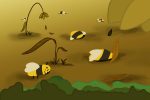According to Greenpeace USA, the number of bee colonies per hectare has dropped by 90% since 1962. Bees are a critical component of human food production, pollinating an estimated one third of the food we eat. So, if the bees go extinct, we’re screwed.
What do bees do?
While grains are primarily pollinated by wind, bees pollinate fruits, nuts and veggies. The process of pollination allows plants to reproduce, creating more crops for us to eat. Plants can be pollinated by many insects and other animals, but bees are the best carrier. A single bee colony can pollinate 300 million flowers a day.
There are many types of bees, but the two main types that humanity benefits from the most are bumblebees and honeybees. Bumblebees are integral wild pollinators and their recent domestication has increased their economic importance. Honeybees, also domesticated, are responsible for 80% of all pollination worldwide and, of course, they produce honey, as well as beeswax and other useful products.
Reasons for Colony Collapse
Female bees, which are the worker bees, live in the summer and winter and are produced in the spring and summer. Bees do not reproduce in the winter, so there is a natural decline in numbers, typically about 5% to 10% percent or 15-20% in a bad year. In the U.S., winter losses have reached 30-50%, sometimes more. The U.S. National Agriculture Statistics Service reported a honeybee decline from 60 million in 1947 to 24 million in 2008.
These drops in numbers are caused by pesticides, drought, habitat destruction, nutrition deficit, air pollution and global warming — most of which involve human interference.
Increased pesticide use is one of the major reasons for the decrease in bee populations. Scientists found more than 150 chemical residues in bee pollen and yet big-name chemical companies continue to ignore the issue. According to Jon Cooksey, writer and director of “How to Boil a Frog,” they spent $11.2 million on a PR initiative to say that this decline is not their fault.
Save the Bees
So, if the big-name companies won’t take responsibility and enact change, then the little people will have to.
Most importantly, legislation needs to be passed to check big companies, forcing them to limit the use of pesticides and harmful agribusiness practices, such as converting grasslands and forests into monoculture farms. Globally, movements have been made toward the preservation of bee populations. In Bavaria, Germany, the “Rettet die Bienen” — in English, “Save the Bees” — movement got 1.8 million signatures on a petition calling for a referendum in support of environmental protection. Its massive support influenced the governing party of Bavaria, the Christian Social Union, to vote the petition’s contents into law. The BeeCareful Project lists initiatives taken in other countries to protect and boost bee populations.
Greenpeace USA suggests that the top seven most dangerous pesticides need to be banned, preservation of wild habitats should be enforced and a return to ecological agriculture should be enacted.
Ecological agriculture — the primary way of farming throughout human history — restores the bee population and, consequently, increases crop yield. It resists insect damage by avoiding large monocrops and preserving ecosystem diversity.
This system restores soil nutrients with natural composting systems and avoids soil loss from wind and water erosion. It limits the use of pesticides and chemical fertilizers, opting for more natural ways of preserving crop yield, and takes advantage of natural ecosystem processes such as water filtration, oxygen production and disease and pest control.
Individual Efforts
There are also changes that can be made on the individual level. You can plant a garden of native flowers and herbs that bloom year-round to provide a constant food source for the bees. If you don’t have room for a full garden, even a windowsill flower bed will work. Although many neighborhoods require lawns to be kept neatly trimmed, it is better for the bees if you keep mowing to a minimum — bees like weeds. If you do live in a neighborhood, consider allowing dandelions and other weeds to grow in just a small section of your yard.
You should also get to know your local beekeeper who practices safe hive care. This allows you to have a relationship with the bees who pollinate your local produce. Bee baths are also useful to have in your garden. A small, shallow dish with something for the bees to land on provides the bees with a way to stay hydrated as they work — and they can carry water back to the colony. Don’t worry about the water getting dirty — it provides more nutrients that the bees need.
There are citizen science projects that you can join that allow you to help research the bees. The ZomBee Project in San Francisco teaches children to watch for zombie-like honeybees that have been infected by the zombie fly parasite, and Bumble Bee Watch recruits individuals across the U.S. and Canada to record the types of bees they see.
If you see a swarm of bees, do not call pest control. Bee swarms are a sign of a healthy colony — it’s a natural form of crowd control. When the colony population grows too large, half will split off and find a new home. The swarm will not harm you and usually dissipates within a few hours. In the words of Bill Tomaszewski, co-founder of PlanetBee, “It’s not biblical; they’re not coming down to attack you.”
Finally, avoid products grown with pesticides. Fruits and vegetables treated with chemicals are poisonous to bees.
Bees are an important part of our global ecosystem. Without bees, we would lose beautiful landscapes and face massive crop losses. Therefore, it is vital that we, both as individuals and as a society, do everything we can to return bee populations to their former glory and to preserve them for future generations.
















